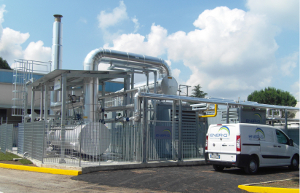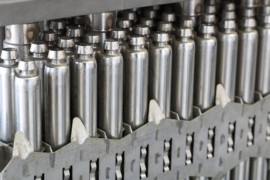
A newly installed trigeneration system is expected to save Coca-Cola’s Italian production facility 40% on energy costs.
The 1280 kWe/715 kWth combined heating, cooling and power (CCHP) system was installed at Coca-Cola HBC Italia’s Marcianise facility in Campania in southern Italy by UK-based ENER-G. It now supplies hot water, steam and chilled water for use in the production and bottling process as well as cooling and electricity, with the water and steam distributed to the production area and bottling lines through a custom-built pipe network.
The system covers 60% of the site’s power demand, 80% of its cooling and almost all of its steam requirements, ENER-G said. A gas engine from MTU forms the basis of the containerized system, with connections to a 500 kW absorption chiller and a recovery boiler.
The plant is expected to produce around 7500 MWh per year and to operate for 6500 hours.
Christian Stella, Managing Director of ENER-G Italia, said: ‘Beverage producers require large amounts of energy for applications such as process cooling, sterilization of bottles and cleaning installations. Proper management of energy use through the installation of a cogeneration plant is one of the most forward-looking investments in this field, with numerous benefits in terms of increased plant efficiency, lower energy costs, reduced CO2 emissions and fast turnaround times.’
The American agri-food giant Coca-Cola is triggering in Italy. A new system of trigeneration has just been installed, and should allow the Italian production unit to reduce its energy costs by 40%.
The factory in question is in the region of Naples, more precisely in the city of Marcianise. The system in question, which will produce heating, cooling and electricity in the form of steam and cold water, is sized at 1280 kWe / 715 kWth.
The energy produced in this way will be used in the bottling process, thanks in particular to a completely customized water and steam distribution system.
This new facility will allow significant cost reduction because it covers 60% of the energy requirements, 80% of the cooling needs and almost 100% of the steam requirements of the site.
Christian Stella, Managing Director at ENER-G Italia, a British company responsible for designing the system, stressed the importance of energy management:







